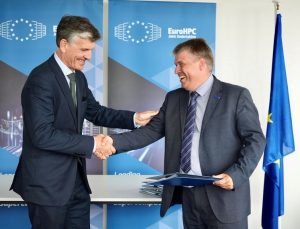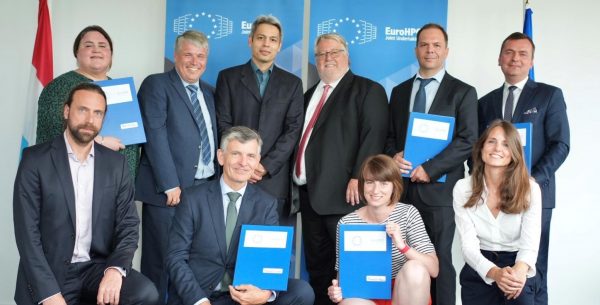June 28, 2023 — The EuroHPC JU has signed hosting agreements with six sites across Europe to host & operate EuroHPC quantum computers. These quantum computers will allow European users to explore a variety of quantum technologies coupled to leading supercomputers.
 The six new EuroHPC quantum computers will be integrated into existing supercomputers in Czechia, France, Germany, Italy, Poland and Spain. The selection of these hosting entities, who will operate the systems on behalf of the EuroHPC JU, was made to ensure a diversity in quantum technologies and architectures, giving Europe an opportunity to be at the forefront of this still-novel field, and providing European users access to diverse and complementary quantum technologies. Representatives of the six hosting entities, the European Commission and EuroHPC JU celebrated today in Luxembourg the signature of these hosting agreements.
The six new EuroHPC quantum computers will be integrated into existing supercomputers in Czechia, France, Germany, Italy, Poland and Spain. The selection of these hosting entities, who will operate the systems on behalf of the EuroHPC JU, was made to ensure a diversity in quantum technologies and architectures, giving Europe an opportunity to be at the forefront of this still-novel field, and providing European users access to diverse and complementary quantum technologies. Representatives of the six hosting entities, the European Commission and EuroHPC JU celebrated today in Luxembourg the signature of these hosting agreements.
The deployment of this novel technology in Europe is the result of collaborative efforts from no less than 17 European countries joining forces to lead the way in quantum computing. Efforts will also be made to build on complementarities thus generating synergies between all systems. Another focus is on standardisation of key components, such as the Application Programming Interface, the monitoring software and the job and user management tools.
These systems will be available primarily for R&D purposes to a wide range of European users, wherever in Europe they are located, to the scientific community, as well as to industry and the public sector. The upcoming quantum computer infrastructure will support the development of a wide range of applications with industrial, scientific and societal relevance for Europe, adding new capabilities to the European supercomputing infrastructure.
Across industry and scientific communities, there is an array of important computing tasks which classical supercomputers struggle to solve. Examples of such complex problems include the optimisation of traffic flows, smart grids and the development of novel drugs and materials based on more accurate quantum mechanical models in chemistry and physics. This is where quantum computing may help and open the door to new approaches to solve these hard-to-compute problems. The integration of quantum computing capabilities in HPC applications will enable scientific breakthroughs and new opportunities for industrial innovations.
The hosting agreements, which have now been signed, are contractual documents that define the roles, rights and obligations of each party. The procurement process for the quantum computers will be managed by EuroHPC JU and will begin in the immediate future.
The quantum computers will be co-funded by the EuroHPC JU budget stemming from the Digital Europe Programme (DEP) and by contributions from the relevant EuroHPC JU participating states. The JU will co-fund up to 50% of the total cost of the quantum computers with a planned total investment of more than EUR 100 million. The exact funding arrangements for each system are reflected in the hosting agreements.
Six New EuroHPC Quantum Computers
LUMI-Q
LUMI-Q will be hosted at the premises of IT4Innovations National Supercomputing Centre (IT4I) in Ostrava, Czechia and integrated into the EuroHPC supercomputer KAROLINA. The LUMI-Q consortium is a true pan-European collaboration effort with 9 European countries involved: Czechia, Finland, Sweden, Denmark, Poland, Norway, Germany, Belgium and the Netherlands.
The LUMI-Q consortium aims to procure a quantum computer based on superconducting qubits in star-shape topology and one-to all qubit connectivity.
More details on the ambitions of the LUMI-Q are available in the press release of IT4I.
EuroQCS-France
EuroQCS-France will be driven by GENCI (Grand Equipement National de Calcul Intensif). The quantum computer will be installed in TGCC, one of the three national computing centres operated by CEA (Commissariat à l’énergie atomique et aux énergies alternatives) in France, where it will be coupled to the supercomputer Joliot-Curie first and then to the upcoming exascale supercomputer conveyed by the Jules Verne consortium.
In parallel, a Fresnel analogue quantum simulator, procured from French start-up PASQAL through the pilot project HPCQS, co-funded by the EuroHPC JU, will also be coupled to the Joliot-Curie supercomputer, giving users access to both technologies through the same infrastructure. The EuroQCS-France consortium is led by France with partners from Ireland, Romania and Germany.
The EuroQCS-France consortium aims to install a photonic quantum computer, on the basis of a quantum-dot-based source of single photons and an integrated programmable quantum interferometer.
Euro-Q-Exa
Euro-Q-Exa will be hosted and operated by the Leibniz Supercomputing Centre of the Bavarian Academy of Sciences and Humanities (LRZ) in Germany, one of the three national supercomputing centers of the Gauss Centre for Supercomputing (GCS), where it will be integrated into the LRZ leadership-class supercomputer, currently SuperMUC-NG.
Euro-Q-Exa aims to deliver a quantum computer based on superconducting qubits arranged in a square-lattice topology with frequency-tunable qubits and couplers. Later on, the Euro-Q-Exa system will provide upgrades in two phases to extend the capabilities of European quantum computers.
The Euro-Q-Exa system will be funded by the EuroHPC JU, the Federal Ministry of Education and Research (BMBF) and the Bavarian State Ministry of Science and the Arts, and is a contributor to the Munich Quantum Valley (MQV).
More details on Euro-Q-Exa is available in the newsflash of GCS and an LRZ blog post.
EuroQCS-Italy
EuroQCS-Italy will be hosted in the data center of CINECA located in the Bologna Technopole in Italy and integrated into the EuroHPC pre-exascale supercomputer Leonardo, currently ranked as the 4th fastest supercomputer in the world. The EuroQCS-Italy consortium is led by Italy with partners from Germany, and Slovenia.
The EuroQCS-Italy consortium aims to integrate a quantum computer based on a neutral atom qubit technology.
EuroQCS-Poland
EuroQCS-Poland will be hosted by the Poznan Supercomputing and Networking Center (PSNC), in Poland and integrated into an HPC infrastructure in Poznan available remotely via PIONIER NREN. PSNC is leading the EuroQCS-Poland consortium consisting of two additional partners from Poland – Center for Theoretical Physics Polish Academy of Science and Creotech Instruments S.A, and one partner from Latvia – University of Latvia.
The EuroQCS-Poland consortium aims to develop a quantum computer based on a trapped ions technology.
EuroQCS-Spain
EuroQCS- Spain will be hosted by the Barcelona Supercomputing Center (BSC) in Spain and integrated into the pre-exascale EuroHPC supercomputer MareNostrum5. The EuroQCS-Spain consortium is led by BSC, and includes Institut de Física d’Altes Energies (IFAE) from Spain and the International Iberian Nanotechnology Laboratory (INL) in Portugal.
EuroQCS-Spain aims to develop an analog quantum computer, complementing the digital quantum computer and the quantum emulator that BSC already hosts under the Quantum Spain initiative. Both quantum systems will be integrated, which will become a heterogeneous computing system made of different partitions: general-purpose, accelerated, next-generation (general purpose and accelerated), analog quantum and digital quantum processing units.
Background
In October 2022, the EuroHPC Joint Undertaking announced the selection of six sites to host European quantum computers. These hosting entities have been selected as a result of a call for expression of interest for the hosting and operation of European quantum computers integrated in HPC supercomputer, launched in March 2022.
These six quantum computers will come on top of two analogue quantum simulators currently being developed under the EuroHPC JU project HPCQS on the basis of neutral atoms, supplied by the French company PASQAL. HPCQS aims to develop and coordinate a cloud-based European federated infrastructure, tightly integrating two quantum computers, each controlling 100-plus qubits in the Tier-0 HPC systems Joliot-Curie of GENCI and the JUWELS modular supercomputer at the Julich Supercomputing Centre (JSC).
Source: EuroHPC JU




























































